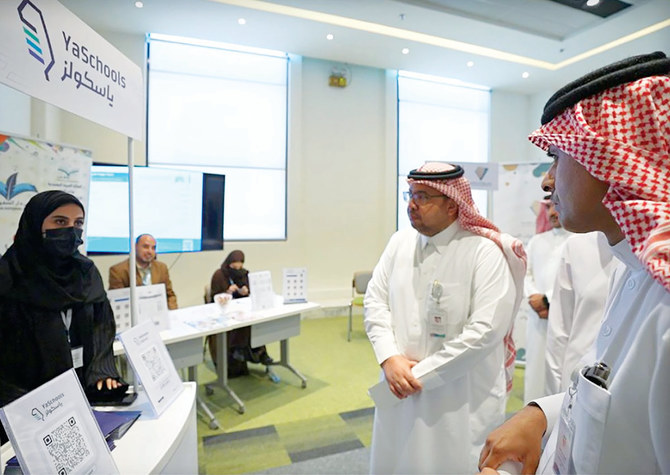CAIRO: Saudi startups are making a profound impact on the Gulf’s business environment, with companies spanning diverse sectors expanding their influence beyond local boundaries to elevate the regional ecosystem.
YaSchools, a Saudi-based educational technology startup, is leading the charge by meticulously planning its entry into the Jordanian market, leveraging its insights into the untapped potential and surging demand for digital education solutions within the country.
In an interview with Arab News, Mohamed Zohair, CEO and founder of YaSchools, revealed that the company is gearing up to commence full operations in Jordan by the last quarter of this year.
“We have completed the basic required steps with our local partner in the Jordanian market, and we are currently seeking to secure the necessary approvals to start our business there,” Zohair added.
The company is positioning itself as a trailblazer in Jordan’s emerging tech landscape, capitalizing on the country’s ongoing educational advancements.
“The Jordanian market is very interested in education, and on the other hand, financial services have developed a lot in the past period, So, presenting YaSchools in the Jordanian market as a pioneer service provider will add a lot to the growth of YaSchools and will help in achieving our strategic goals,” Zohair said.
In the ever-changing landscape of education, YaSchools serves as a lynchpin, offering tailored solutions to each stakeholder in the educational ecosystem, Zohair explained.
For parents, YaSchools serves as more than an informational hub — it stands as a financial ally. Beyond offering school insights, the platform equips families with flexible tuition payment plans spread over 12 months, coupled with exclusive tuition discounts. Moreover, it facilitates access to qualified private tutors, ensuring personalized academic support for their children.
For educational institutions, YaSchools functions as a digital extension of their administrative efforts, providing a suite of innovative products that empower schools to foster more meaningful interactions with parents, streamline financial management, and seamlessly integrate with existing internal systems.
“For teachers, we provide them with a full profile page that contains all the professional information and academic achievements that they have obtained. It is also possible to view the job opportunities available in schools and apply for them directly,” Zohair said.
Corporations, both governmental and private, can also benefit from YaSchools’ offerings, “we offer their employees discounts on tuition fees, while facilitating their instalments without the need to visit the school or the bank,” Zohair explained.
“Simply the services that YaSchools currently provides puts it in a leading position in the Saudi market,” he added.
In just two years of operations, the company has already amassed over 100,000 registered customers on its platform, recording more than 5 million visits in the past 12 months. Looking forward, YaSchools aims to onboard around 200 schools from Jordan and attract over 5,000 parents by the end of the year.
“The platform currently has more than 92,000 registered parents, and the number is increasing all the time. We expect this number will exceed 110,000 by the end of this year,” Zohair stated.
While YaSchools is considering the prospect of setting up an office in Jordan, it currently plans to operate through its local agent’s office in Amman. Additionally, Zohair mentioned that the company will soon make another announcement concerning its expansion plans in the second half of 2024.
Elaborating on YaSchools’ long-term objectives, the CEO emphasized the company’s ambition to establish itself as the go-to platform for parents making educational decisions for their children.
Zohair highlighted that their offerings extend beyond schooling and encompass areas like ongoing development, sports training, entertainment, psychological and health care.
Regarding the Saudi market, the company is actively pursuing strategic partnerships with government institutions to enhance the overall customer experience, Zohair revealed.
“The Saudi market in general is an excellent market, and the current period is more mature than before, especially with the unprecedented support in digital transformation, financial services, and accompanying legislation and regulations,” Zohair said.

Mohamed Zohair, CEO of YaSchools
At the core of its philosophy, the company asserts that the evolution of the learning process is multi-faceted, Zohair explained.
“It not only hinges on augmenting student knowledge and skills but also on elevating the educational infrastructure, particularly the human resources who interact with students daily,” he added
On the other hand, he said artificial intelligence technologies are an ongoing journey that the company is currently working on the platform to develop several services.
“We are also working on developing a product that will help the management of education companies in hiring the best cadres for their companies through a matchmaking mechanism between job requirements and available jobs,” he added.
The company’s business model operates on a commission-fee basis, but Zohair stated: “We are still working on developing the best business model.”
It currently generates direct revenues from facilitating parents’ financing of tuition fees, in addition to other revenues from enhancing the digital presence of educational companies.
YaSchools raised $600,000 in a seed funding round in August, receiving support from angel investors. Looking ahead, Zohair underlined the company’s need for additional capital to drive its expansion plans.
“We seek to raise $2 million for pre-series A round, and we plan to finish this round early next year. The investment plan will target collecting this money from venture capitals,” he concluded.
















